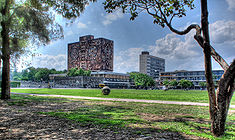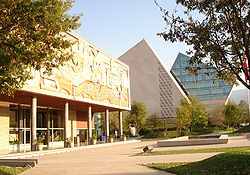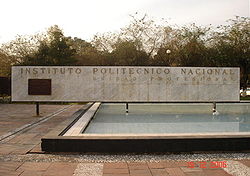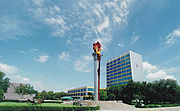
Education in Mexico
Encyclopedia
Education in Mexico is regulated by the Secretariat of Public Education . Education standards are set by this Ministry at all levels except in "autonomous" universities chartered by the government (e.g., UNAM
). Accreditation of private schools is accomplished by a mandatory approval and registration with this institution.
The 1917 Constitution provides that education should avoid privileges of religion
, and that one religion or its members may not be given preference in education over another. Religious instruction is prohibited in public schools; however, religious associations are free to maintain private school
s, which receive no public funds. Proof of Mexican citizenship is required to attend public schools for free, but foreigners can attend public schools by paying a tuition.
In the same fashion to other education systems, education may be described in identifiable stages, such as Primary School, Junior High School, High School, Higher education, and Postgraduate education.
(preparatoria), comprising grades 10-12.
Depending on definitions, Primary education comprises primaria and secundaria, which are compulsory by law, while Secondary education only includes preparatoria, which is not yet compulsory.
Depending on the school, a bilingual education may be offered from the beginning, where half the day instruction is in Spanish, and the rest is in a second language, for example, English
or French
.
In Spanish, the general term for "school" is escuela, but in Mexico, it is common to use escuela for state-owned schools, which are the majority, while the term colegio (cognate
with "college") is reserved for private schools, usually charging higher tuition
fees.
At this level, more specialized subjects may be taught such as Physics and Chemistry, and World History.
Despite the similarities of the words "Secondary school" and secundaria, in Mexico the former is usually translated to preparatoria, while in other countries, such as Puerto Rico
, or within the Spanish-speaking populations of the United States, the term secundaria refers to High School.
Preparatoria traditionally consists of three years of education, divided into six semesters, with the first semesters having a common curriculum, and the latter ones allowing some degree of specialization, either in physical sciences (electricity
, chemistry
, biology
, etc.) or social sciences (commerce
, philosophy
, law
, etc.).
The term preparatoria is most commonly used for institutions that offer a three-year education program that "prepares" the student with general knowledge to continue studying at a university. In contrast, the term bachillerato is most often used for institutions that provide vocational training
, in two or three years, so the graduate can get a job as a skilled worker
, for example, an assistant accountant
, a bilingual secretary
or an electronics
technician
.
undergraduate level (Licenciatura), and two degrees at the postgraduate level, a 2-year Master's degree
(Maestría), and a 3-year Doctoral degree (Doctorado).
This structure of education very closely conforms to the Bologna Process
started in Europe
in 1999, allowing Mexican students to study abroad and pursue a Master's degree after Licenciatura, or a Doctoral degree after Maestría.
s, depending on the college or university, and lead to a Bachelor's degree (Licenciatura).
Although in theory every graduate of a Licenciatura is a Licenciate (Licenciado, abbreviated Lic.) of his or her profession, it is common to use different titles for common professions such as Engineering and Architecture.




Unam
UNAM or UNaM may refer to:* National University of Misiones, a National University in Posadas, Argentina*National Autonomous University of Mexico , the large public autonomous university based in Mexico City...
). Accreditation of private schools is accomplished by a mandatory approval and registration with this institution.
The 1917 Constitution provides that education should avoid privileges of religion
Religion
Religion is a collection of cultural systems, belief systems, and worldviews that establishes symbols that relate humanity to spirituality and, sometimes, to moral values. Many religions have narratives, symbols, traditions and sacred histories that are intended to give meaning to life or to...
, and that one religion or its members may not be given preference in education over another. Religious instruction is prohibited in public schools; however, religious associations are free to maintain private school
Private school
Private schools, also known as independent schools or nonstate schools, are not administered by local, state or national governments; thus, they retain the right to select their students and are funded in whole or in part by charging their students' tuition, rather than relying on mandatory...
s, which receive no public funds. Proof of Mexican citizenship is required to attend public schools for free, but foreigners can attend public schools by paying a tuition.
In the same fashion to other education systems, education may be described in identifiable stages, such as Primary School, Junior High School, High School, Higher education, and Postgraduate education.
Basic education
In Mexico, basic education is normally divided in three steps: primary school (primaria), comprising grades 1-6; junior high school (secundaria), comprising grades 7-9; and high schoolHigh school
High school is a term used in parts of the English speaking world to describe institutions which provide all or part of secondary education. The term is often incorporated into the name of such institutions....
(preparatoria), comprising grades 10-12.
Depending on definitions, Primary education comprises primaria and secundaria, which are compulsory by law, while Secondary education only includes preparatoria, which is not yet compulsory.
Primary School
The terms "Primary School" or "Elementary School" usually corresponds to primaria, comprising grades 1-6, when the student's age is 6 to 12 years old. It starts the basic compulsory education system.Depending on the school, a bilingual education may be offered from the beginning, where half the day instruction is in Spanish, and the rest is in a second language, for example, English
English language
English is a West Germanic language that arose in the Anglo-Saxon kingdoms of England and spread into what was to become south-east Scotland under the influence of the Anglian medieval kingdom of Northumbria...
or French
French language
French is a Romance language spoken as a first language in France, the Romandy region in Switzerland, Wallonia and Brussels in Belgium, Monaco, the regions of Quebec and Acadia in Canada, and by various communities elsewhere. Second-language speakers of French are distributed throughout many parts...
.
In Spanish, the general term for "school" is escuela, but in Mexico, it is common to use escuela for state-owned schools, which are the majority, while the term colegio (cognate
Cognate
In linguistics, cognates are words that have a common etymological origin. This learned term derives from the Latin cognatus . Cognates within the same language are called doublets. Strictly speaking, loanwords from another language are usually not meant by the term, e.g...
with "college") is reserved for private schools, usually charging higher tuition
Tuition
Tuition payments, known primarily as tuition in American English and as tuition fees in British English, Canadian English, Australian English, New Zealand English and Indian English, refers to a fee charged for educational instruction during higher education.Tuition payments are charged by...
fees.
Junior High School
The terms "Junior High School" or "Middle School" usually correspond to secundaria, comprising grades 7-9, when the student's age is 12 to 15 years old. It is part of the basic compulsory education system, it follows primary school, and comes before proper "high school" (preparatoria).At this level, more specialized subjects may be taught such as Physics and Chemistry, and World History.
Despite the similarities of the words "Secondary school" and secundaria, in Mexico the former is usually translated to preparatoria, while in other countries, such as Puerto Rico
Puerto Rico
Puerto Rico , officially the Commonwealth of Puerto Rico , is an unincorporated territory of the United States, located in the northeastern Caribbean, east of the Dominican Republic and west of both the United States Virgin Islands and the British Virgin Islands.Puerto Rico comprises an...
, or within the Spanish-speaking populations of the United States, the term secundaria refers to High School.
High School
The term "High School" (United States) or gymnasium (German, Dutch systems) usually corresponds to preparatoria or bachillerato, comprising grades 10-12, when the student's age is 15 to 18 years old. Students may choose between 2 main kinds of high school programmes: The SEP incorporated programme and a University Incorporated one, depending on the state. Other minority of programmes are available only for private schools, such as the International Baccalaureate Which carries a completely different system. Nevertheless, in order to be taught, it must include a national subject at least.Preparatoria traditionally consists of three years of education, divided into six semesters, with the first semesters having a common curriculum, and the latter ones allowing some degree of specialization, either in physical sciences (electricity
Electricity
Electricity is a general term encompassing a variety of phenomena resulting from the presence and flow of electric charge. These include many easily recognizable phenomena, such as lightning, static electricity, and the flow of electrical current in an electrical wire...
, chemistry
Chemistry
Chemistry is the science of matter, especially its chemical reactions, but also its composition, structure and properties. Chemistry is concerned with atoms and their interactions with other atoms, and particularly with the properties of chemical bonds....
, biology
Biology
Biology is a natural science concerned with the study of life and living organisms, including their structure, function, growth, origin, evolution, distribution, and taxonomy. Biology is a vast subject containing many subdivisions, topics, and disciplines...
, etc.) or social sciences (commerce
Commerce
While business refers to the value-creating activities of an organization for profit, commerce means the whole system of an economy that constitutes an environment for business. The system includes legal, economic, political, social, cultural, and technological systems that are in operation in any...
, philosophy
Philosophy
Philosophy is the study of general and fundamental problems, such as those connected with existence, knowledge, values, reason, mind, and language. Philosophy is distinguished from other ways of addressing such problems by its critical, generally systematic approach and its reliance on rational...
, law
Law
Law is a system of rules and guidelines which are enforced through social institutions to govern behavior, wherever possible. It shapes politics, economics and society in numerous ways and serves as a social mediator of relations between people. Contract law regulates everything from buying a bus...
, etc.).
The term preparatoria is most commonly used for institutions that offer a three-year education program that "prepares" the student with general knowledge to continue studying at a university. In contrast, the term bachillerato is most often used for institutions that provide vocational training
Vocational school
A vocational school , providing vocational education, is a school in which students are taught the skills needed to perform a particular job...
, in two or three years, so the graduate can get a job as a skilled worker
Skilled worker
A skilled worker is any worker who has some special skill, knowledge, or ability in their work. A skilled worker may have attended a college, university or technical school. Or, a skilled worker may have learned their skills on the job...
, for example, an assistant accountant
Accountant
An accountant is a practitioner of accountancy or accounting , which is the measurement, disclosure or provision of assurance about financial information that helps managers, investors, tax authorities and others make decisions about allocating resources.The Big Four auditors are the largest...
, a bilingual secretary
Secretary
A secretary, or administrative assistant, is a person whose work consists of supporting management, including executives, using a variety of project management, communication & organizational skills. These functions may be entirely carried out to assist one other employee or may be for the benefit...
or an electronics
Electronics
Electronics is the branch of science, engineering and technology that deals with electrical circuits involving active electrical components such as vacuum tubes, transistors, diodes and integrated circuits, and associated passive interconnection technologies...
technician
Technician
A technician is a worker in a field of technology who is proficient in the relevant skills and techniques, with a relatively practical understanding of the theoretical principles. Experienced technicians in a specific tool domain typically have intermediate understanding of theory and expert...
.
Higher education
Higher education usually follows the US education model with an at least 4-year Bachelor's degreeBachelor's degree
A bachelor's degree is usually an academic degree awarded for an undergraduate course or major that generally lasts for three or four years, but can range anywhere from two to six years depending on the region of the world...
undergraduate level (Licenciatura), and two degrees at the postgraduate level, a 2-year Master's degree
Master's degree
A master's is an academic degree granted to individuals who have undergone study demonstrating a mastery or high-order overview of a specific field of study or area of professional practice...
(Maestría), and a 3-year Doctoral degree (Doctorado).
This structure of education very closely conforms to the Bologna Process
Bologna process
The purpose of the Bologna Process is the creation of the European Higher Education Area by making academic degree standards and quality assurance standards more comparable and compatible throughout Europe, in particular under the Lisbon Recognition Convention...
started in Europe
Europe
Europe is, by convention, one of the world's seven continents. Comprising the westernmost peninsula of Eurasia, Europe is generally 'divided' from Asia to its east by the watershed divides of the Ural and Caucasus Mountains, the Ural River, the Caspian and Black Seas, and the waterways connecting...
in 1999, allowing Mexican students to study abroad and pursue a Master's degree after Licenciatura, or a Doctoral degree after Maestría.
Undergraduate studies
Undergraduate studies normally last at least 4 years, divided into semesters or quarterAcademic quarter (year division)
An academic quarter refers to the division of an academic year into four parts, found in a minority of universities in the United States and in some European and Asian countries.-Background and trends:...
s, depending on the college or university, and lead to a Bachelor's degree (Licenciatura).
Although in theory every graduate of a Licenciatura is a Licenciate (Licenciado, abbreviated Lic.) of his or her profession, it is common to use different titles for common professions such as Engineering and Architecture.
- Engineer, Ingeniero, abbreviated Ing.
- Electrical Engineer, Ingeniero Eléctrico
- Electronics Engineer, Ingeniero Electrónico
- Mechanical Engineer, Ingeniero Mecánico
- Computer Systems Engineer, Ingeniero en Sistemas Computacionales, abbreviated I.S.C.
- Architect, Arquitecto, abbreviated Arq.
- Licenciate, any degree, specially those from social sciences, Licenciado, abbreviated Lic.
Postgraduate studies
New regulations since 2005 divide postgraduate studies at Mexican universities and research centers in two main categories:- Targeted at professional development
- Especialización. A 1-year course after a Bachelor's degree (Licenciatura), which awards a Specialization Diploma (Diploma de Especialización).
- Maestría. A 2-year degree after a Bachelor's degree (Licenciatura), which awards the title of Master (Maestro).
- Targeted at scientific research
- Maestría en Ciencias. A 2-year degree after a Bachelor's degree (Licenciatura), which awards the title of Master of Science (Maestro en Ciencias).
- Doctorado en Ciencias. A 3-year degree after a Master's degree (either Maestría or Maestría en Ciencias), or a 4-year degree directly after the Bachelor's degree (Licenciatura) for high-achieving students, which awards the title of Doctor of Science (Doctor en Ciencias).
School years
The table below describes the most common patterns for schooling in the state sector:



| Minimum age (common) | Year | Months | Schools | ||
|---|---|---|---|---|---|
| 2 | N/A | N/A | Nursery Nursery school A nursery school is a school for children between the ages of one and five years, staffed by suitably qualified and other professionals who encourage and supervise educational play rather than simply providing childcare... |
Maternal | |
| 3 | 1° de preescolar | N/A | Pre-School | Kinder / Jardin de Niños / Educación preescolarsdfadf | |
| 4 | 2° de preescolar | N/A | |||
| 5 | 3° de preescolar | N/A | |||
| 6 | 1° de primaria | N/A | Primary school / Elementary school Elementary school An elementary school or primary school is an institution where children receive the first stage of compulsory education known as elementary or primary education. Elementary school is the preferred term in some countries, particularly those in North America, where the terms grade school and grammar... |
Primaria / Educación básica | |
| 7 | 2° de primaria | N/A | |||
| 8 | 3° de primaria | N/A | |||
| 9 | 4° de primaria | N/A | |||
| 10 | 5° de primaria | N/A | |||
| 11 | 6° de primaria | N/A | |||
| 12 | 1° de secundaria | N/A | Secondary school Secondary school Secondary school is a term used to describe an educational institution where the final stage of schooling, known as secondary education and usually compulsory up to a specified age, takes place... / Middle school Middle school Middle School and Junior High School are levels of schooling between elementary and high schools. Most school systems use one term or the other, not both. The terms are not interchangeable... / Junior High School |
Secundaria / Educación básica | |
| 13 | 2° de secundaria | N/A | |||
| 14 | 3° de secundaria | N/A | |||
| 15 | 4°/1° de preparatoria | 1st and 2nd semesters | High school High school High school is a term used in parts of the English speaking world to describe institutions which provide all or part of secondary education. The term is often incorporated into the name of such institutions.... |
Preparatoria / Bachillerato / Educación media superior | |
| 16 | 5°/2° de preparatoria | 3rd and 4th semesters | |||
| 17 | 6°/3° de preparatoria | 5th and 6th semesters | |||
| 18 | N/A | 1st and 2nd semesters / 1st, 2nd and 3rd quarters | Bachelor's degree Bachelor's degree A bachelor's degree is usually an academic degree awarded for an undergraduate course or major that generally lasts for three or four years, but can range anywhere from two to six years depending on the region of the world... / Licentiate Licentiate Licentiate is the title of a person who holds an academic degree called a licence. The term may derive from the Latin licentia docendi, meaning permission to teach. The term may also derive from the Latin licentia ad practicandum, which signified someone who held a certificate of competence to... |
Licenciatura / Educación superior | |
| 19 | N/A | 3rd and 4th semesters / 4th, 5th and 6th quarters | |||
| 20 | N/A | 5th and 6th semesters / 7th, 8th and 9th quarters | |||
| 21 | N/A | 7th and 8th semesters / 10th quarter | |||
| N/A | N/A | ... | Master's degree Master's degree A master's is an academic degree granted to individuals who have undergone study demonstrating a mastery or high-order overview of a specific field of study or area of professional practice... |
Maestría | |
| N/A | N/A | ... | Doctorate Doctorate A doctorate is an academic degree or professional degree that in most countries refers to a class of degrees which qualify the holder to teach in a specific field, A doctorate is an academic degree or professional degree that in most countries refers to a class of degrees which qualify the holder... |
Doctorado | |
Sources
- Department of State (2004). International Religious Freedom Report 2004. Mexico. Washington, D.C.Washington, D.C.Washington, D.C., formally the District of Columbia and commonly referred to as Washington, "the District", or simply D.C., is the capital of the United States. On July 16, 1790, the United States Congress approved the creation of a permanent national capital as permitted by the U.S. Constitution....
: Bureau of Democracy, Human Rights, and Labor. - US Department of Education (2003) Education around the World: Mexico.

